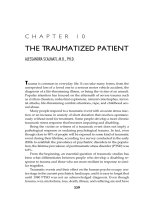Ebook The vanished library: Part 2
Bạn đang xem bản rút gọn của tài liệu. Xem và tải ngay bản đầy đủ của tài liệu tại đây (9.63 MB, 99 trang )
PART II
THE SOURCES
I
Gibbon
E
ow ARD Gibbon commented that if Omar really
ordered the books to be burned, 'the fact is indeed
marvellous' (The Decline and Fall of the Roman Empire,
1838 ed., vol. VI, p. 452). Gibbon's source was the
Specimen Historiae A rabum of Gregory Abulpharagius, a
thirteenth-century Jewish doctor known as Bar Hebraeus,
in the seventeenth-century Latin translation (1649) made
by Edward Pococke, the great orientalist of Corpus Christi
College. Gibbon goes on to remark that
the solitary report of a stranger who wrote at the end of six
hundred years on the confines of Media is overbalanced by
the silence of two annalists of a more early date, both Christians, both natives of Egypt, and the most ancient of whom,
the patriarch Eutychius [AD 876-940], has amply described
the conquest of Alexandria.
He notes also the 'silence of Abulfeda, Murtadi, and a
crowd of Moslems'. He then comments:
The rigid sentence of Omar is repugnant to the sound and
orthodox precept of the Mahometan casuists: they expressly
1°9
The Vanished Library
declare, that the religious books of the Jews and Christians,
which are acquired by the right of war, should never be
committed to the flames.
His authority here is Hadrianus Reland, the distinguished
Dutch Arabist who lived at the end of the seventeenth
century. In his De jure militari Mohammedanorum, Reland
explains that the religious books of Jews and Christians
were not burned for reasons 'derived from the respect that
is due to the name of God'.
Gibbon does not question the view thatJohn Philoponus
was still alive when the Arabs conquered Alexandria, a view
founded on the Arabic sources, beginning with the important Index (al-Fihrist) made by the son of 'al-Warraq' ('the
bookseller'), which lists every Arabic book and translation
into Arabic that its compiler had examined up until the
year 988. This dating accords with what we can infer from
Philoponus's commentary on the fourth book of Aristotle's
Physics, where he remarks: 'I set it down that today is the
tenth of May of the year 333 since the beginning of the
reign of Diocletian' (Commentaria in Aristotelem Graeca,
vol. XVII, Berlin 1888, p. 703). Unfortunately, however,
some ambiguity attaches to this piece of evidence. The
year is given as 333 in several codices, including some of
the best, such as the twelfth-century Laurentian MS 87. 6.
But it appears as 233 in the fourteenth- or fifteenth-century
Greek Marcian MS 230 - written, according to Vitelli,
who prepared the Berlin edition, 'rather carelessly'. The
first figure corresponds to 6 17, and the second to 5 17,
in the Christian calendar. Fabricius, the authority whom
110
Gibbon
Gibbon follows, took the remark in the commentary on
the Physics as confirming the Arabic sources, which state
that Philoponus was alive in 640 AD and that he conversed with Amrou. Elsewhere in his works, however to be precise, in the sixteenth book of his polemic Against
Proclus on the Eternity ofthe World - Philoponus writes: 'And
now in our times, in the year 245 since Diocletian's reign.'
Fabricius, appealing to the general sense of the passage in
which this phrase occurs, suggested that the time indication was to be understood 'rather loosely' (paulo laxius), and
that Philoponus's words should be rendered 'Nam et non
longe a nostris temporibus anno 245 Diocletiani' ('Now not
long from our own times, in the year 245 of Diocletian')
(Bibliotheca Graeca, vol. X, p. 644 in Harles' revised edition). The fact remains that the presence in Simplicius's
commentary on Aristotle's De caelo of certain quotations
from the Replies to Aristotle on the Eternity ofthe World (a lost
work attributed to Philoponus) inclined scholars as early
as the eighteenth century to prefer the less recent date
and to regard the supposed meeting between Philoponus
and Amrou as the consequence of confusion in the Arabic
sources.
John Philoponus's work was well known to the Arabs,
and played an important part in the spread of Aristotle's
thought during the early centuries of Arabic culture. This
must be the basis ofthe connection between Philoponus and
Amrou which figures in the Arabic historical sources. Ibn
al-Kifti relates the dialogue in which John gives a summary
account ofthe opening episode of Aristeas' Letter, the meeting between Ptolemy and Demetrius in the library precincts
III
The Vanished Library
(an English version ofthis passage, from the Arabic text prepared by Hussein Mones, is given by Edward A. Parsons,
TheAlexandrian Library, New York 1952, pp. 389-392). The
name Philaretes is found in certain manuscripts containing
the Latin translation of Philoponus's work on Pulsations
(Fabricius, Bibliotheca Graeca, X, p. 652).
Gibbon's aim, as a man of the enlightenment, was to
acquit the Arabs of a crime they had never in his view
committed. He sought to lay the blame for the destruction of the library on the shoulders of Caesar, who had
wrought such havoc during the Alexandrian war, and above
all on the terrible archbishop Theophilus, who razed the
Serapeum and whom Gibbon describes as 'the perpetual
enemy of peace and virtue; a bold, bad man, whose hands
were alternately polluted with gold, and with blood' (Decline
and Fall, III, 519): Gibbon here confuses the palace library
with the library in the Serapeum, an error in which he follows Tertullian (;1pologetics, 18, 8) and above all Ammianus
Marcellinus (XXII, 16). 'I shall not recapitulate', he writes,
the disasters of the Alexandrian library, the involuntary flame
that was kindled by Caesar in his own defence, or the mischievous bigotry of the Christians who studied to destroy the
monuments of idolatry.... But if the ponderous mass of
Arian and Monophysite controversy were indeed consumed
in the public baths, a philosopher may allow, with a smile,
that it was ultimately devoted to the benefit of mankind (VI,
452 f.).
For Gibbon, the fate of the great libraries of antiquity
is linked above all to the history of the classical textual
tradition. In the spirit of Voltaire, he draws a positive
112
Gibbon
balance even at the foot of this melancholy record of
fanatical despoliation and human folly. He betrays a certain teleological optimism, and sets a low value on what has
been lost:
I sincerely regret the more valuable libraries which have been
involved in the ruin ofthe Roman empire; but when I seriously
compute the lapse of ages, the waste of ignorance, and the
calamities of war, our treasures, rather than our losses, are
the object of my surprise.
And he then goes on to write in terms which make clear
his sense of tradition, his evaluation of what has perished,
and the characteristics or criteria which have in his view
determined the survival of certain works:
Many curious and interesting facts are buried in oblivion; the
three great historians of Rome have been transmitted to our
hands in a mutilated state, and we are deprived of many
pleasing compositions of the lyric, iambic and dramatic poetry
of the Greeks. Yet we should gratefully remember, that the
mischances of time and accident have spared the classic works
to which the suffrage of antiquity [here there is a reference,
in a footnote, to Quintilian's critical enumeration of classical
texts] had adjudged the first place of genius and glory.
Gibbon notes, too, that the 'teachers of ancient knowledge', whose works survive, have an especial value as
repositories of the knowledge of earlier times: he mentions
Aristode, the elder Pliny and Galen among those who 'had
perused and compared the writings of their predecessors',
and concludes:
113
The Vanished Library
Nor can it fairly be presumed that any important truth, any
useful discovery in art or nature, has been snatched away from
the curiosity of modern ages (p. 454).
114
2
The Dialogues of Alllrou
O
RIENTAL and Arabic tradition preserves the record
of dialogues between the emir Amrou ibn el-Ass and
a number of important historical figures: the Byzantine
emperor, who challenged the Arab claim to the possession
of Syria; Benjamin, the Jacobite patriarch of Egypt, whose
favour Amrou was shrewd enough to gain; John I, Jacobite patriarch of Syria; and John Philoponus. Patrologia
Orientalis (volume I, 19°3, pp. 494-498) prints texts of
the accounts of his meeting with the Egyptian patriarch.
His conversation with John, patriarch of Syria, referred
to at the beginning of chapter XVI above, was brought
to light by the discovery in the British Museum of a
Syriac manuscript (Add. MS 17193) on which the copyist
finished work in August 874. Abbot Fran~ois Nau, coeditor of Patrologia Orientalis, unearthed the manuscript,
confirmed its authenticity, and published the text, together
with a translation and commentary, in the Journal Asiatique
of March-April 1915 (series XI, volume V, pp. 225-279).
Nau showed that the patriarch John mentioned in the title
of the dialogue must be John I, who held that position from
635 until December 648, during the time when Amrou,
115
The Vanished Library
with the support of the disaffected subject people of the
empire, was conquering Syria (Antioch fell in 638).
The text found in this miscellaneous codex (Add. MS
17 I 93) is presented as an account of the dialogue compiled by John himself a few days after his meeting with
Amrou. The date, given at the outset, corresponds to
9 May 639. (The manuscript is thus rather more than two
centuries later than the dialogue it records.) Nau regards
it as certain that Amrou and the Syrian patriarch really did
meet, and suggests that this was a clever tactical move on
the part of the emir. In 639, Amrou was still engaged in
the conquest of Mesopotamia, where the Jacobite communities, monophysites following the Syriac observance, had
great influence. Amrou accordingly decided to win their
spiritual head over to his side.
In their dialogue, Amrou was concerned not only with
Christology but also with the question whether there was
one single holy book. Amrou's views have been seen as
paralleling the abrupt dogmatism of Omar's verdict. 'The
distinguished emir', so the patriarch relates, 'asked us
whether a single gospel was held to be true by all those
who profess to be Christians and who go by the name
of Christians in the world.' When the patriarch replied
in the affirmative, Amrou objected that in that case it
was impossible to understand how Christians had become
divided into the different 'faiths' to which they seemed to
adhere. The patriarch's response was marked by its broad
tolerance: the Pentateuch, he said, was also regarded as a
sacred book by men professing different religions, such as
Jews, Christians, and Moslems. Amrou then approached
116
The Dialogues ofAmrou
the issue from another angle, posing various concrete
empirical questions (how, for instance, should a man divide
his inheritance among his heirs?) and asking whether the
Christian gospel contained answers to queries of that kind.
Told that the gospel was concerned only with 'heavenly
doctrine and vivifying precepts', he exhorted the patriarch,
in fatherly terms, 'either to show me that your laws are
contained in your gospel and thus that you regulate your
lives in accordance with it, or else to follow Moslem law
without more ado'. The patriarch's reply was a defence of
plurality: 'We Christians have laws too' - that is, laws apart
from the gospel- 'but these are in accord with the precepts
of the gospel, the canons of the apostles and the laws of the
church.'
However, and contrary to Nau's opinion, Amrou's position should not be seen as prefiguring the fatal dilemma
posed by Omar. According to the Syriac historian Michael,
it was after this very dialogue that the emir asked the patriarch to have the Christian gospel translated into Arabic albeit omitting the bizarre passages referring to Christ's
divinity. And when John protested at this, he gave way
with good grace, saying, 'Very well, write it as you
wish' (Chronique ecclesiastique, II, pp. 431-432). In such
a conciliatory climate, it need not surprise us that the
'Moslem' gospel of Barnabas contains a variant account of
the crucifIXion, with Judas crucified in Christ's place. This
version accords with the statement in the Koran (sura IV,
156) that 'they did not crucify him, and a man resembling
him was put in his place'.
117
The VanishedLibrary
A learned Jew also took part in this colloquy between
Amrou and the Jacobite patriarch of Syria. He had been
called in by Amrou, who wanted to establish the original Hebrew reading of a passage in Genesis (19, 24) in
which the word 'Lord' occurs twice ('Then the LORD
rained upon Sodom and upon Gomorrah brimstone and
fire from the LORD out of heaven'). The passage, evidently, furnishes rare opportunities for Christological dispute. Asked whether the text read thus in the Jewish
Law, the learned Jew replied, according to the patriarch's
account, that he 'could not say with certainty'.
JI8
3
Revisions of Aristeas
I
N his record of the dialogue between Amrou and 10hn
Philoponus, the Egyptian-born Arab historian Ibn alKifti gives 10hn a long speech in which the origin and
history of the library at Alexandria are recalled. A good
part of this is freely adapted from Aristeas' Letter, but there
is one significant change. In Aristeas' Letter, Demetrius
assures his sovereign that the planned total of 500,000
scrolls will 'soon' be reached (paragraph 10), and draws
his attention only to the special case of the '1ewish Law'.
In Ibn al-Kifti's account, however, when the king, told that
54,000 books have now been collected, asks 'How many do
we still lack?', he receives a much more disquieting reply.
Zamira (the Arabic form of 'Demetrius') lists the peoples
whose books must be acquired before the library can be
called 'complete': the inhabitants of 'northern India, India,
Persia, Georgia, Armenia, Babylon, Musalla, the territory
of Rum [Byzantium]'.
An exactly similar reworking ofAristeas' account is found
at the beginning of the De mensuris et ponderibus of Bishop
Epiphanius (3 I 5-403 AD), who became Metropolitan of
Cyprus in his old age. Epiphanius's remarkable work has
119
The Vanished Library
been called a 'biblische Realencyklopadie' (Altaner and
Stuiber, Patrologie, Freiburg-Basel-Wien, 1966 [seventh
ed.], p. 3 16). It consists, first of all, of an account of
the translation into Greek of the Old Testament. Within
this pithy and valuable discussion, the author - as was,
indeed, quite customary - indulges in a digression concerning the library at Alexandria. Having already mentioned
Ptolemy Philadelphus, in whose reign the seventy-two
translators carried out their task, Epiphanius continues as
follows:
The second sovereign of Alexandria after Ptolemy, to wit the
king known as Ptolemy Philadelphus, was a man who loved
beauty and culture. He founded a library in this same city of
Alexandria, in the district known as Bruchion (a quarter now
altogether abandoned), and he put one Demetrius Phalereus in
charge of it, instructing him to collect together all the books of
the world.... The work proceeded, and books were gathered
from all parts, until one day the king asked the director of the
library how many books had been collected. The director replied: 'There are about 54,800. We hear, however, that there
is a great quantity of books among the Ethiopians, the Indians,
the Persians, the Elamites, the Babylonians, the Chaldaeans,
the Romans, the Phoenicians and the Syrians.' [Here Epiphanius inserts a parenthesis, remarking that 'at that time
the Romans did not yet bear that name, and were called
Latins'. He then gives Demetrius's words once more.] 'At
Jerusalem, in Judea, too, there are sacred books that speak
of God ...' (Patrologia Graeca, volume 43, cols. 250 and 252).
Epiphanius then recounts the exchange ofletters between
Ptolemy and Eleazar. Here, too, Aristeas' text is reworked:
120
Revisions ofA ristea
among other changes, the king's letter is addressed not to
Eleazar in person but to the Jews in general. Ibn al- Kifti,
for his part, omits all reference to the Jews.
The two lists of peoples are worth commenting on. In
Epiphanius, we find a mixture of peoples known in Biblical
tradition (Elamites, Assyrians-Babylonians, and so on) and
'present-day' places (Rome, Ethiopia, India). The Arab
chronicler includes places (Georgia, Armenia) within the
sphere of Arabic rule and influence. In these ways, the
original list is brought up to date.
Ibn al-Kifti makes use of Epiphanius's work, taking from
it the figure of 54,000 which he gives as the number of
scrolls collected in the library at Alexandria in the reign
of Ptolemy Philadelphus (the figure appears nowhere else
in the extensive body of material derived from Aristeas).
He modifies his source in some places, and interprets it
in others. One instance is the reference to the Romans.
'The Romans', for Epiphanius, were the inhabitants of
Latium or Italy, and he therefore adds a note to inform
his readers that they were at one time called 'Latins'.
Ibn al-Kifti can have made little of this note, for to him
Romaioi meant 'Byzantines', that being the usage current
in his world. The Byzantines were Greeks. Ironically, then,
successive reworkings of Aristeas culminated in this version
given by the medieval Arab chronicler according to which
the library at Alexandria actually lacked the books of the
Greeks.
Only part of Epiphanius's book is preserved in Greek,
but the whole work survives in Syriac translation (Altaner
and Stuiber, p. 316). It was highly regarded in Arabic
121
The Vanished Library
culture, and enjoyed a wide currency. Among those who
made good use of it was the author of the Preface to
the Arabic version of the Pentateuch (the text of which
was published in Latin translation in 1692 in Oxford,
in the volume entitled Aristeae Historia LXX interpretum,
p. 13 1).
122
4
Aulus Gellius
G
IBBON, like many subsequent scholars, draws his
data about the destruction of the library of Alexandria from Ammianus Marcellinus (XXII, 16, 13), the
Antiochene historian and admirer of Julian the Apostate.
However, quite apart from the fact that Ammianus confuses
the royal library with the library in the Serapeum (a point
already mentioned: he tries to escape his own confusion by
saying that there are several valuable libraries - bybliothecae
inaestimabiles, - in the Serapeum), he cannot be regarded
as an independent source. His account is derived from the
Attic Nights of Aulus Gellius (VII, 17), where we read that
Pisistratus, the Tyrant, is said to have been the first to make
books concerning the liberal arts available to the public to read.
Afterwards, the Athenians themselves built up the collection
with care and toil. But when Xerxes occupied Athens and
burned the city apart from the Acropolis, he stole all this
wealth of books and took them away with him to Persia. Much
later King Seleucus, known as Nicanor, had all these books
restored to Athens.
Afterwards a very great many books were collected or
made in Egypt, by the Ptolemies; as many as seven hundred
12 3
The Vanished Library
thousand scrolls. But in the course of the first war of Alexandria, during the sack of the city, all these thousands of scrolls
were given to the flames: not spontaneously, to be sure, nor
by intention, but accidentally, by the auxiliaries.
Ammianus, for his part, writes that 'the seven hundred
thousand scrolls so laboriously and indefatigably collected
by the Ptolemies were burned in the war ofAlexandria, during the sack of the city, under the dictatorship of Caesar'.
He uses the same words as Gellius, except that he alters,
or rather glosses, the phrase bello pn"ore Alexandn"no dum
diripitur ea civitas to read bello Alexandrino, dum dinpitur
civitas sub diaatore Caesare.
From the summary given at its beginning, however, it
seems that Gellius's chapter originally included no reference to the library at Alexandria. (These summaries, written by the author, appear at the end of the general preface,
giving an overall picture of the work's contents; and each
then reappears in its place at the head of the successive
chapters.) The summary promises an account of 'who first
founded a public library and ho\\'- many books there were
in Athens in the public libraries before the defeats in the
Persian wars'. There is nothing about the second part of
the chapter, which deals with Alexandria. And this second
part is clumsily tacked onto the first, giving the impression
that Ptolemy came after Seleucus in terms of chronology.
The author of this second part had, moreover, a remarkably precise idea of those responsible for the burning of
the library: they were, he informs us unequivocally, certain
milites auxiliarii, 'auxiliaries'. As we know (from the Bellum
Alexandn·num), Caesar was helped, during the Alexandrian
12 4
A ulus Gel/ius
conflict, by the arrival of troops under prince Mithridates
of Pergamum who came to his support. The author of the
interpolated passage obviously took the view that the terrible destruction of books could not have been perpetrated
by Romans.
We need hardly point out that he, too, refers to the
mythical 'sack of Alexandria'. He is further discredited by
his complete failure to take account of the precise details
about the circumstances and spread of the fire which were
readily available both in the Bel/urn A lexandn'nurn and in the
many sources based on Livy (see chapter III above).
125
5
Isidore of Seville
O
F the two parts of Gellius's chapter, the first deal-
ing with Athens and the second with Alexandria,
Ammianus uses (and slightly modifies) only the second.
Isidore of Seville, by contrast, uses only the first. In his
encyclopaedic work on Etymologies, in the chapter entitled,
precisely, De bibliothecis, he writes (VI, 3, 3) as follows:
On libraries. Library, bibliotheca, is a word of Greek origin:
the term derives from the fact that books are kept there. We
can translate: bib/ion, of books; theke, depository. 2. After the
books of the Law were burned by the Chaldaeans, the library
of the Old Testament was restored by Esdras, inspired by the
Holy Spirits; ht corrected every volume of the Law and the
Prophets, which had been corrupted by the Gentiles, and
established the entire Old Testament in twenty-two books,
in such a way that the number of books might correspond
with the number of letters. 3. Among the Greeks, on the
other hand, it is thought that Pisistratus, tyrant of Athens,
was the first to found a library: this library, subsequently built
up by the Athenians, was taken to Persia by Xerxes, after the
burning of Athens: much later, Seleucus Nicanor returned it
to Greece. 4. And from here grew the fashion, known among
126
Isidore ofSeville
all sovereigns and in every city, for obtaining the books of
various peoples and, by the work of translators, turning them
into Greek. 5. This is why Alexander the Great, or perhaps
his successors, set about building libraries in which every
book would be contained. And Ptolemy called Philadelphus,
in particular, who was deeply versed in letters and who vied
with Pisistratus in his devotion to libraries, brought together
in his library not only the works of the gentiles but the holy
scriptures too. In fact, seventy thousand volumes were to be
found in Alexandria in those days.
There follows a chapter entitled De interpretibus, which
opens with the story, derived from Aristeas, of the seventytwo translators of the Old Testament.
Isidore thus draws on Gellius in his discussion of Pisistratus. In the sequel he no longer does so, even though he,
like Gellius, goes on to discuss Alexandria and its scrolls.
This may be mere chance. However, it is not unlikely that
Isidore's edition ofGellius, early in the seventh century, did
not yet include the section on Alexandria in chapter 17 of
Book VII.
In that case, how can Ammianus, three centuries before
Isidore, possibly have known it? Ammianus may in fact have
had access not to Gellius, but simply to the source also used
by the author of the interpolated passage in Gellius.
Now even though the two passages under consideration the one in Gellius, the other in Isidore - very clearly share
a common element (the history of Pisistratus's library), the
prevailing view of modern scholars is that they derive from
two different sources (both of which are lost), namely
127
The Vanished Library
Varro's De bibliothecis in the former case and Suetonius's
De viris illustribus in the second. This scholarly consensus
is all the more surprising given that neither author makes
any reference to the sources he is using.
Why are such venerable antecedents ascribed to the two
passages? The reason is not far to seek: such antecedents
enhance their standing as historical evidence. So eminent
an authority as Carl Wendel, for instance, has described
Gellius's account of the library at Alexandria as laying
'sole claim to historical validity', and he argues that we
can thus be confident that 'at the moment when the library
was burned its scrolls numbered seven hundred thousand'
(see Milkau-Leyh, Handbuch der Bibliothekswissenschaft,
III, 1 [second ed.], Wiesbaden 1955, p. 69). However,
Peter Marshall Fraser, an authoritative but lonely voice,
has commented more recently that the figure given by
Gellius and Ammianus certainly deserves less credence
than other figures (Ptolemaic Alexandria, Oxford 1972, II,
p. 493, note 224)·
Wendel, in a simplified version ofthe general view which
he does not support by any detailed discussion, derives the
passage in both Gellius and Isidore from Varro's treatise.
Why choose Varro? Caesar, as is well known, formally appointed Varro to the 'care ofthe library' (cura bibliothecarum:
Suetonius, Life ofCaesar, 44). A careful scholar and a great
collector of books, Varro prepared for his task by making a
series of studies ofthe topic. The fruit ofhis labours was the
De bibliothec£s. This is the basis on which modern scholarship has built, arriving at its present view by the following
not entirely logical series of steps. Pliny (Naturalis Historia,
128
Isidore ofSeville
XIII, 68-70), discussing the writing materials used in the
Greco-Roman world, cites an absurd theory, attributed
(perhaps wrongly) to Varro, that papyrus-leaf was adopted
only at the time of 'the victory of Alexander the Great', a
theory which Pliny soon proceeds to demolish. Because
Isidore likewise devotes certain chapters of his sixth Book
(9- 12) to the topic of writing materials (de ceris, de cartis, de
pergamenis, de libris conficiendis: 'on writing-tablets, paper,
parchment and the making of books'), the inference has
been drawn that he must depend on Varro by way of
Suetonius (he cites Suetonius elsewhere, in an entirely
different connection). Dahlmann, for example, advances
this thesis in his article on Marcus Terentius Varro in the
'Pauly-Wissowa' Encyclopedia (VIth Supplement (1935),
column 1221). Reifferschied, the editor of Suetonius's
Reliquiae (1860), went so far as to include these chapters
among Suetonius's 'remains'.
The fact is that on an essential point Isidore says exactly
the contrary of Varro: cartarum usum primum Aegyptus
ministravit, 'the Egyptians were the first to make use of
paper' (VI, 10, I).
Their extreme eagerness to recover at least some part
of Varro's text has led scholars to conclude that every
piece of information about books and libraries found in
later writers must derive from him - including (Dahlmann
argued) the chapter of Isidore entitled de bibliothecis (VI,
3). The paradoxical conclusion has even been reached
that the chapter should be attributed not to Isidore but to
'Suetonius apud Isidore' (see Marshall's Oxford edition of
Gellius, Volume I, Oxford 1968, p. 272).
12 9
The Vanished Library
The passage of Isidore actually has points of contact with
texts of quite another kind, above all Tertullian'sApologetics
(18, 5), where we read:
Ptolemy called Philadelphus, who was deeply versed in letters
and who vied (as I believe) with Pisistratus in his devotion to
libraries [thus far the text is the same as Isidore, VI, 3, 5],
among other documents whose age or curious interest made
them worthy of preservation, asked also - on the suggestion
of Demetrius Phalereus, a grammarian much esteemed at
that time, whom he appointed to an official position - for
books from the Jews . . . [there follows a paraphrase of the
celebrated passage in Aristeas' Letter].
The same text is reflected in Jerome's letters (Letter XXXIV, to Marcella): Jerome writes that the blessed
Pamphilus, who wanted to build a sacred library, cum
Demetrium Phalereum et Pisistratum in sacrae bibliothecae
studio vellet aequare ('wanted to rival Demetrius Phalereus
and Pisistratus in the care he devoted to his sacred library').
Here again, then, the references to ancient libraries
revolve around the central episode of the translation of
the Old Testament as recounted by Aristeas - with whose
narrative Tertullian was quite familiar. We find exactly
the same thing in Isidore (VI, 3 and 4: de bibliothecis,
de interpretibus): Isidore, like Tertullian, inserts Gellius's
remark about Pisistratus (but not what he says about the
destruction of the Museum, for this passage was unknown
to him) into a context whose main event is the translation
of the Old Testament as recounted by Aristeas. He here
reflects a tradition which seems to have little in common
13°
Isidore ofSeville
with either Varro or Suetonius.
At least three textual parallels can be found to passages
in Isidore's de bibliothecis (VI, 3): Gellius, VII, 17, 1-2
(paralleled in VI, 3, 3); Tzetzes, De comoedia, p. 43 in
Koster's edition, 11- 13 (paralleled in VI, 4, where we are
told that the books not just of the Jews but of all other
peoples were translated); and Tertullian, Apologetics, 18, 5
(paralleled in VI, 5, in the account of the translation of the
Old Testament). It is probable that these three sources were
found alongside one another in the text actually consulted
by Isidore.
13 1









